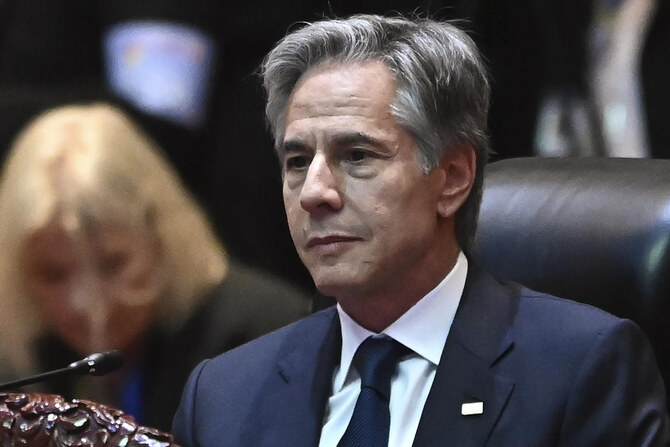VIENTIANE, Laos: US Secretary of State Antony Blinken voiced hope Friday for a diplomatic solution in Lebanon and preventing a broader conflict, as he backed efforts by the fragile state to assert itself against Hezbollah.
Blinken again said that Israel, which has been carrying out deadly strikes on Lebanon, “has a right to defend itself” against Hezbollah, but voiced alarm over the humanitarian situation.
“We continue to engage intensely to prevent broader conflict in the region,” Blinken told reporters after an East Asia Summit in Laos.
“We all have a strong interest in trying to help create an environment in which people can go back to their homes, their safety and security, kids can go back to school,” he said.
“So Israel has a clear and very legitimate interest in doing that. The people of Lebanon want the same thing. We believe that the best way to get there is through a diplomatic understanding, one that we’ve been working on for some time, and one that we focus on right now.”
He said the United States would work to support the fragile Lebanese state to build itself up after Hezbollah’s long-held sway.
“It’s clear that the people of Lebanon have an interest — a strong interest — in the state asserting itself and taking responsibility for the country and its future,” he said.
He also said that the United States was voicing concern directly to Israel on the humanitarian situation in Gaza.
“I have real concern about the inadequacy of the assistance that’s getting to them,” Blinken said, adding that the United States has been “very directly engaged with Israel” on the topic.
Concern in Asia about prospect of Middle East conflicts
US Secretary of State Antony Blinken said also on Friday there was deep concern in Asia about the plight of people in Gaza and conflict in the Middle East and stressed Washington was doing everything in its power to prevent those from spreading.
Speaking in Laos after the East Asia Summit, Blinken said concerns about the Middle East came up in conversations with other leaders, during which he reiterated Washington was dedicated to diplomacy to control the situation in the face of what he called an Iranian-led axis of resistance.
“The intense focus of the United States, which has been the case going back a year, and doing just that, (is) preventing these conflicts from spreading. And we’re working on that every day,” Blinken told a press conference.
“We’re working very hard through deterrence and through diplomacy to prevent that from happening. There’s also obviously deep concern that we share about the plight of children, women, and men in Gaza, who for now a year have been caught in a terrible crossfire of Hamas’ instigation.”
Blinken also said the United States was directly engaged with Israel to stress how imperative it was that the humanitarian needs of people in Gaza are met.
Israel had the right to defend itself from attacks from Hezbollah, he added, and like the United States, it had a clear and legitimate interest in creating an environment where tens of thousands of displaced people in southern Lebanon can return to their homes.
“It’s also vitally important that in doing that, they focus on making sure that civilians are protected and, again, are not being caught in a terrible crossfire,” he said.
Blinken also gave his reassurances of the US commitment to the Indo-Pacific region, regardless of the outcome of the upcoming US presidential election, adding it was critical to US interests.
“Even with everything else going on, our focus has remained intensely on this region,” he said.
“It’s my belief that basic approach will continue, irrespective of who’s president, because it’s so manifestly in our interest.”
“There’s strong support in Congress for our engagement in the region across parties and across both houses of Congress. And I don’t see that changing,” he said.






















